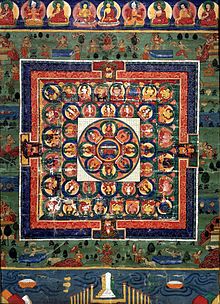You are currently logged-out. You can log-in or create an account to see more talks, save favorites, and more. more info
Perfect Wisdom Talks

Prajñāpāramitā means "the Perfection of Wisdom" or "Transcendental Knowledge" in Mahāyāna Buddhism. Prajñāpāramitā refers to a perfected way of seeing the nature of reality, as well as to a particular body of Mahāyāna scriptures (sūtras), known as the Prajñāpāramitā sutras, which includes such texts as the Heart Sutra and Diamond Sutra.
The word Prajñāpāramitā combines the Sanskrit words prajñā "wisdom" (or "knowledge") with pāramitā, "excellence," "perfection," "noble character quality," or "that which has gone beyond," "gone to the other side," "transcending." Prajñāpāramitā is a central concept in Mahāyāna Buddhism and is generally associated with ideas such as emptiness (śūnyatā), 'lack of svabhāva' (essence), the illusory (māyā) nature of things, how all phenomena are characterized by "non-arising" (anutpāda, i.e. unborn) and the Madhyamaka thought of Nāgārjuna. Its practice and understanding are taken to be indispensable elements of the Bodhisattva path.
According to Edward Conze, the Prajñāpāramitā Sūtras are "a collection of about forty texts ... composed somewhere on the Indian subcontinent between approximately 100 BC and AD 600." Some Prajnāpāramitā sūtras are thought to be among the earliest Mahāyāna sūtras.
| Title | Speaker | |
|---|---|---|
Awakening Through Present Wisdom Precepts, Perfect Wisdom, Liberation, Patience |
Apr 30 2000 |
|
Experiencing Reality Beyond Perception Posture, Perfect Wisdom, Delusion, Letting Go, Buddha Mind |
Nov 02 1986 |